The Healthiest Parrot Food: A Comprehensive Guide
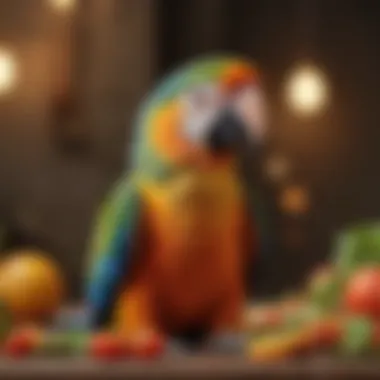
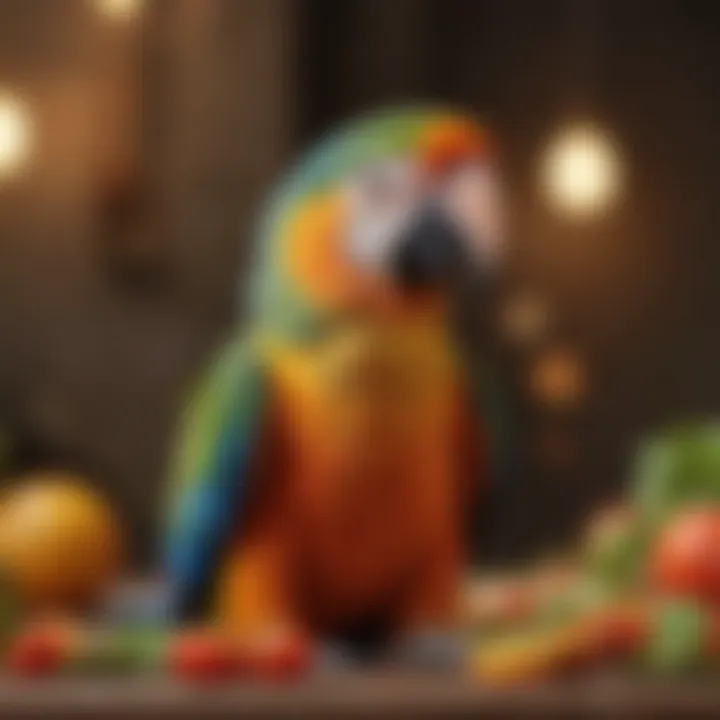
Intro
Feeding your parrot is not just about satisfaction; it's about understanding their unique dietary needs. Parrots are more than mere pets; they are intelligent beings that require specific nutrition to thrive. A proper diet can mean the difference between a vibrant, vocal friend and a tired, less interactive companion. This guide sets out to explore the healthiest food options available for your feathered family member, not only by examining nutritional requirements specific to different parrot species but also by diving into the offerings available in the market.
What do you consider food? It's more than just seeds tossed in a bowl. Think nuts, fruits, and even vegetables. It is essential, as a responsible owner, to be informed about what contributes positively to your parrot's health. This isn’t just a matter of appeal, but of longevity and happiness for your pet.
So grab a cup of coffee, sit back, and let’s embark on this journey to craft the best meal plan for your parrot friend.
Understanding Your Pet
Pet Behavior Basics
Before we even dive into what to feed your parrot, it's critical to get a grasp of their behavior. Parrots are known for their inquisitive nature. They’re naturally curious and are keen to explore their environment. This means they often mimic sounds and words. Understanding this behavior can inspire you to offer a varied diet that keeps them engaged. Parrots appreciate the difference between textures and tastes, so varying their diet can mirror their inquisitive tendencies.
Common Breed Characteristics
Each parrot species comes with its own quirks and preferences. For instance, African Grey parrots are particularly known for their incredible intelligence and vocal skills. Cockatiels, on the other hand, are social butterflies that thrive on companionship. Knowing what makes each breed tick can guide you in tailoring their meals. A few common breeds include:
- Budgerigar: Generally small and friendly; they thrive on seeds, fruits, and veggies.
- Amazon Parrot: Those lively, larger birds enjoy a mix of pellets and fresh produce.
- Lovebirds: Often social and playful, they need a mix of seeds and veggies to stay sprightly.
Species-Specific Needs
Not every parrot has the same dietary needs. For example, larger species like Macaws require a diet rich in fats, which can be found in nuts. On the other hand, smaller parrots such as parakeets need a decent mix of seeds supplemented with fresh fruits and greens. Consider this essential blueprint:
- Fruits: Apples, bananas, or berries, all great for vitamins.
- Vegetables: Leafy greens such as kale or spinach, providing vital nutrients.
- Grains and Seeds: Whole grains as a base diet or seeds to supplement moods and energy levels.
"A diverse diet leads to a happier, healthier parrot."
Recapping, understanding your parrot's behavior and specific needs is just the first piece of the puzzle in crafting their perfect diet. As we progress through the guide, we will cover other crucial areas, ensuring your feathered friend leads a healthy and fulfilling life. Remember, caring for a parrot is like playing an ongoing game of chess; it requires strategy and knowledge for the best outcome.
Understanding Parrot Nutritional Needs
Creating a healthy diet for parrots is about more than just filling their bowls and hoping for the best. Understanding their nutritional needs can make all the difference between a lively, vibrant bird and one that's struggling with health issues. Parrots, like any other pets, rely heavily on a balanced diet that addresses their specific requirements for growth, energy, and long-term well-being. By grasping these needs, pet owners can not only improve their parrots’ quality of life but also prevent potential health problems down the road.
Macronutrients Essential for Parrots
Proteins
Proteins are the building blocks of life, and for parrots, they play a crucial role in growth, maintenance, and repair of tissues. These nutrients are critical to feather development, muscle health, and overall vitality. Parrots need a variety of protein sources to thrive, especially during molting or when they are undergoing significant life changes. A key characteristic of proteins is their amino acids. Some of these are essential, meaning parrots cannot synthesize them and must obtain them from their diet. Foods rich in protein, like legumes, cooked eggs, and certain nuts, can be beneficial, though care must be taken as too much protein can lead to kidney issues.
Fats
Fats are another important macronutrient that parrots cannot live without. They provide essential fatty acids, which are vital for maintaining healthy skin and feathers. Occasionally, owners might shy away from fats thinking they contribute to obesity and other health issues, but in moderation, they can be quite helpful. The unique feature of fats is that they serve as a concentrated energy source, particularly important for active parrots or those going through breeding cycles. Including seeds such as sunflower or pumpkin can be a good route, but it’s wise to limit quantities to avoid excessive weight gain.
Carbohydrates
Carbohydrates often get a bad rap, but they serve as a primary energy source for parrots. They should not be disregarded in a parrot’s diet. Fruits, vegetables, and whole grains are excellent sources, providing not just energy but also fiber that helps digestion. A comprehensive view of carbohydrates highlights their role in maintaining gut health. Though carbohydrates have advantages, pet owners need to be careful, as too many sugary fruits can lead to obesity and other metabolic disorders. Striking a balance is key here.
Vitamins and Minerals for Optimal Health
Vitamin A
When it comes to parrot health, Vitamin A certainly stands out as a key player. This vitamin is necessary for skin health, vision, and maintaining a robust immune system. Green leafy vegetables like spinach and carrots are often loaded with Vitamin A and should be a common sight in a parrot’s diet. Unlike some other vitamins, Vitamin A can have a downside if overconsumed, so moderation should be kept in mind.
Calcium
Calcium is a mineral that parrots absolutely can’t do without, especially for building strong bones and healthy eggs in females. It’s also crucial for muscle function and nerve transmission. The importance of calcium cannot be overstated; green leafy veggies, seeds, and crushed oyster shells are great sources. However, it's worth noting that an imbalance can lead to health problems like metabolic bone disease, particularly in species with higher calcium needs. A well-rounded approach to calcium ensures a robust, healthy parrot.
Zinc
Zinc, while required in smaller amounts, still holds significant importance for parrots. This mineral supports metabolic function, immune health, and skin integrity. Zinc deficiency can lead to a range of health issues, from poor feather quality to increased susceptibility to illness. Including zinc-rich foods like nuts and certain seeds can help ensure your parrot remains healthy and vibrant.
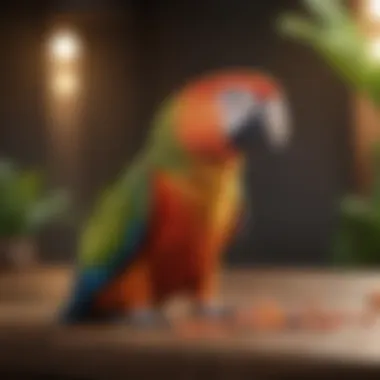
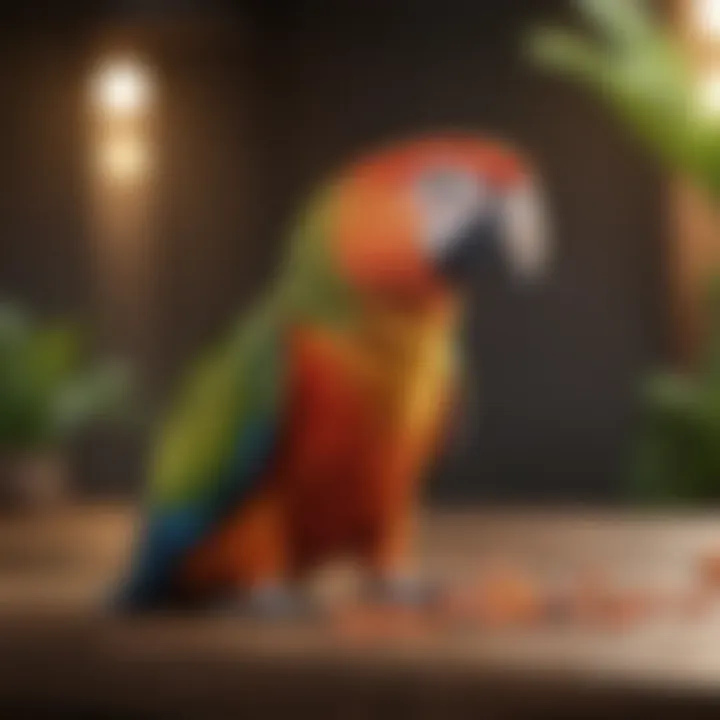
Water: The Often Overlooked Element
Many times, water is taken for granted by bird owners, but it plays a vital role in parrot health. Hydration is crucial for nearly all bodily functions, including digestion, circulation, and temperature regulation. Often, pet owners may not realize that fresh water needs to be available at all times. Regularly cleaning water containers is necessary to prevent bacterial growth. Keeping water fresh not only encourages parrots to drink more but also serves as an essential component of their overall nutrition.
"Hydrated parrots are happy parrots, ready to engage in playful antics or just enjoy a quiet perch."
Natural Diets for Parrots
Exploring natural diets for parrots is pivotal for understanding how to nourish these vibrant creatures properly. Parrots in the wild have access to a diverse array of foods which contribute significantly to their health and longevity. Mimicking this natural diet in captivity not only offers physical benefits but also helps in meeting the behavioral needs of these intelligent birds.
By incorporating a variety of fruits, vegetables, seeds, and nuts, parrot owners can promote a balanced nutritional profile that aligns closely with what they would naturally forage in the wild. An emphasis on natural diets enables pet owners to provide a holistic approach to their parrot’s well-being, ensuring they receive the nutrients they need while also stimulating their foraging instincts.
Fruits and Vegetables
Fruits and vegetables are vital components of a parrot's diet and offer numerous health benefits. They provide essential vitamins, minerals, and antioxidants that are integral to a parrot's health.
Selection of Safe Fruits
Selecting safe fruits for parrots is crucial to preventing dietary-related health issues. Not all fruits are suitable for your feathered friend. Common safe options include apples, bananas, and oranges, which not only are appealing to parrots but also rich in necessary nutrients.
A key characteristic of safe fruits is their high water content, which helps keep your parrot hydrated. However, it’s prudent to wash all fruits meticulously to eliminate any pesticides or chemicals. One of the advantages of incorporating these fruits is the joy they bring to your parrot’s eating experience, as many birds are naturally inclined to the sweetness of fruit.
Nutritional Benefits of Vegetables
Vegetables hold a treasure trove of nutrients that are beneficial for parrots. Leafy greens such as kale and spinach, along with colorful bell peppers and carrots, should be routinely offered. One vital aspect of vegetables is their fiber content, which aids in digestion.
These colorful additions not only support digestive health but also bolster the immune system, making them an indispensable part of a parrot’s diet. Many parrot owners find that offering varied bright vegetables enhances their companion’s appetite, encouraging diverse eating habits that mirror their natural dietary preferences.
Seeds and Nuts
Seeds and nuts are often a staple among parrot diets, but they must be given in moderation. They add healthy fats and protein, yet their high caloric content means caution is advised.
Types of Seeds Ideal for Parrots
Certain seeds are particularly nourishing for parrots. Sunflower seeds, for instance, are a popular choice for many owners due to their palatability and energy content, which can benefit active birds. On the other hand, seeds like hemp and millet are lower in fat and can serve as healthier alternatives.
The appeal of seeds lies in that they stimulate foraging behavior, contributing to mental stimulation, which improves overall well-being. However, it's important to limit seed intake to prevent obesity and maintain a balanced diet.
The Role of Nuts in Parrot Diets
Nuts play a critical role in the parrot diet by offering a source of healthy fats and proteins. Almonds, walnuts, and cashews enhance a parrot's meal with nutritious fats that are essential for energy. They also contain high levels of vitamin E, acting as an antioxidant. In particular, almonds can support heart health owing to their rich omega-3 fatty acid profile.
While nuts are a great addition, they should be offered sparingly due to their high-fat content. It’s important to keep the focus on a balanced diet to avoid issues related to excessive fat intake, ensuring that nuts serve as a treat rather than the primary food source.
Whole Grains and Legumes
Whole grains and legumes round out the natural diet for parrots. These foods provide complex carbohydrates and additional protein, playing an essential role in overall nutrition.
Grains like oats and quinoa are excellent choices. They are rich in vitamins and deliver energy while offering fiber, which is beneficial for digestion. Adding cooked legumes like lentils or chickpeas can also enhance dietary variety and promote overall health.
In summary, aligning a parrot's diet to reflect natural feeding habits by integrating fruits, vegetables, seeds, nuts, whole grains, and legumes can profoundly influence their vitality, offering not just sustenance but a chance for a more fulfilling life.
Commercial Parrot Food: Evaluating Options
Understanding the various types of commercial parrot food is crucial for any bird owner aiming to ensure their feathered friends are healthy and happy. Each type of food comes with its own set of advantages and potential drawbacks, influencing not only the nutritional well-being of the parrot but also its behavior and overall health. By becoming familiar with these options, owners can make informed decisions tailored to the specific needs of their parrots—even when navigating the dizzying array of brands and products on the market.
Types of Commercial Food Available
Pelleted Diets
Pelleted diets are often considered the gold standard in commercial parrot food. These diets usually combine a wide range of nutrients into a compact shape, making it easier for parrots to consume balanced meals.

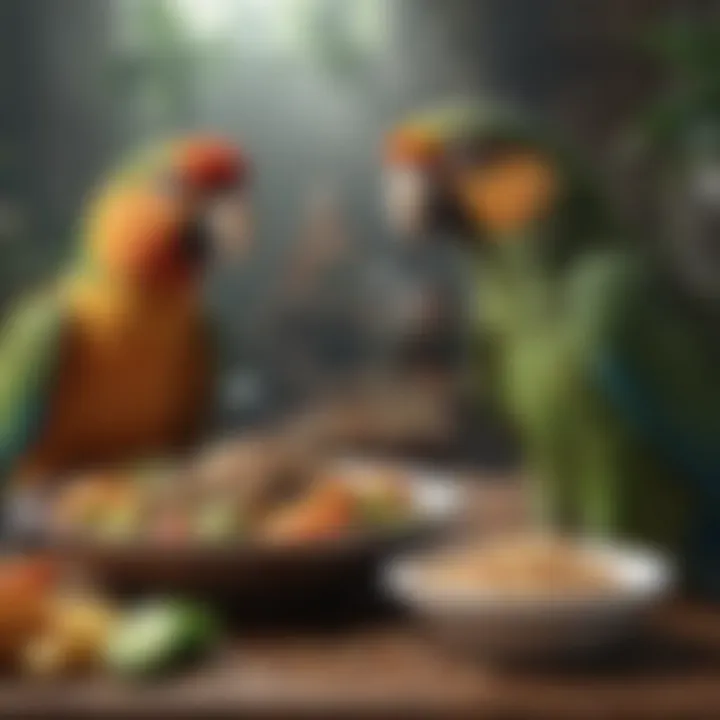
One key characteristic of pelleted diets is their formulation. They are designed based on extensive research into avian nutrition, ensuring that parrots receive vitamins, minerals, and proteins in a palatable form. The major benefit of these diets lies in their ability to prevent selective eating, which can occur if parrots are given a seed-only diet.
However, not all pelleted diets are created equal; some might have added sugars or artificial flavors. Thus, it is vital for owners to choose high-quality pellets that prioritize natural ingredients, reducing potential health risks.
Seed Mixes
Seed mixes remain a popular option among parrot owners, offering a buffet of tastes and textures. These blends often contain a variety of seeds like sunflower, millet, and safflower. Seeds can be rich in fats and calories, thus providing energy, but they may fall short in essential nutrients like vitamins and minerals.
The key feature of seed mixes is choice. Parrots often have individual preferences, and providing a mix can lead to happier and more engaged birds. However, reliance solely on seed mixes can lead to nutritional imbalances, as parrots may pick out their favorite seeds rather than eat a balanced selection. It’s important for owners to complement seed mixes with fresh fruits and vegetables for a more rounded diet.
Extruded Foods
Extruded foods are another category gaining popularity among parrot enthusiasts. This type of feed is made by cooking ingredients and forcing them through a mold, resulting in a dry, crunchy texture. One major benefit of extruded foods is that they generally have higher digestibility rates than traditional seed mixes. Plus, they often come fortified with essential vitamins and minerals, making them an excellent choice for promoting health.
A unique feature of extruded foods is their uniformity. Because of the extrusion process, the nutritional content is consistent throughout the pellets, providing a reliable dietary option. However, not all extruded foods deliver the same quality, and some may follow the same pitfalls as pelleted diets if not chosen wisely.
Assessing Ingredient Quality
Understanding Labels
Understanding food labels is critical when selecting commercial parrot food. Labels can reveal a wealth of information regarding the composition of the diet, but they can also be misleading. Reading labels closely allows bird owners to appreciate the type and quality of ingredients present in the food.
The emphasis here is on transparency. High-quality brands often list whole ingredients rather than fillers, enabling owners to understand what they are feeding their parrots fully. This can save owners from making poor choices that could lead to health issues.
Identifying Low-Quality Ingredients
Identifying low-quality ingredients can be a daunting task, yet it is extremely important for ensuring the health and well-being of a parrot. Ingredients such as artificial colorings, preservatives, or unrecognizable fillers often suggest a product is of lower quality.
The key characteristic of low-quality ingredients is their lack of nutritional value. They can lead to increased health concerns, perform poorly in terms of palatability, and could be harmful in the long run. Owners need to be vigilant and know how to evaluate the ingredients list to promote a healthier lifestyle for their birds.
Top Recommended Brands
Choosing the right brands for your parrot’s diet can influence its health significantly. Well-regarded brands often prioritize avian-specific formulas, using fresh ingredients and high production standards. While there are numerous options available, researching a brand’s reputation can provide valuable insights about its product quality.
In summary, by carefully evaluating available commercial parrot food, owners ensure that their pets receive a nutrient-rich diet, ultimately leading to better health outcomes and a longer lifespan.
Species-Specific Dietary Considerations
Understanding the dietary requirements of different parrot species is key for any parrot owner who desires to promote their feathered friend's health. Just like humans, parrots have individual needs based on their species, metabolic rates, and habits. Failing to recognize these differences can lead to nutritional shortfalls and health problems. This section will explore the dietary needs of specific parrot types, focusing on Macaws, Cockatoos, and Amazons. Choosing the right diet for them is not just about what they like; it’s about what’s right for their health and longevity.
Dietary Needs by Parrot Types
Macaws
Macaws are often celebrated for their vibrant colors and playful personalities. These social birds require a diet that reflects their natural food sources, primarily fruits, nuts, and seeds. A key aspect of a Macaw’s diet is the high-fat content found in various nuts such as walnuts and almonds. This high-fat intake aids their energy levels, supporting their active lifestyle.
Macaws also need a good portion of fruits and vegetables. Including varied fruits not only adds essential vitamins but also provides hydration. A downside, however, is the risk of obesity if portion control isn’t maintained. Macaws love food, and without careful monitoring, they might pack on the pounds too easily. Plus, they can be picky eaters, which may require some creativity in meal planning.
Cockatoos
Cockatoos are known for their affectionate nature and strong social bonds. Their diets need to be rich in various nutrients and should include a mix of pellets, fresh fruits, and some occasional seeds. A distinct feature of Cockatoos is their high calcium requirement, particularly due to their susceptibility to bone health issues. This means including calcium-rich options such as dark leafy greens, legumes, and pertain foods is essential.
On the downside, Cockatoos may develop behavioral issues if they're not kept properly stimulated. Their good-natured temperament can lead to overindulgence in food, which again can result in health problems. They are also sensitive to dietary changes, so any adjustments should be approached cautiously.
Amazons
Amazons are spirited and vocal, bring a lively atmosphere to any home. Their diet typically consists of a balanced mixture of pellets, vegetables, and fruits. A key trait of Amazons is their preference for a fibrous diet, which helps their digestion. Vegetables such as carrots and bell peppers should be a staple in their meals.
A benefit to their slightly more robust digestive system is that Amazons can often tolerate a broader variety of foods but are also prone to weight gain if overfed. They enjoy snacking, which means portion control is quite critical. Being aware of their higher caloric needs can help avoid some common pitfalls associated with overfeeding.
Lifespan and its Dietary Implications
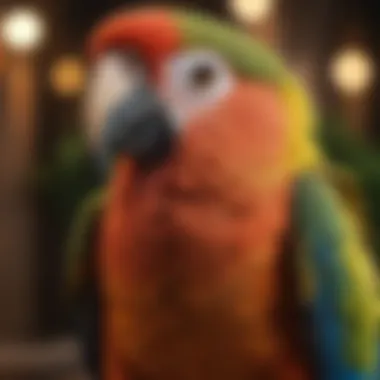

The lifespan of parrots can vary widely based on species, but generally speaking, many parrots live for several decades. This longevity implies that their dietary needs will evolve throughout their lives. Older parrots may require diets lower in calories yet high in specific nutrients to maintain their health, while younger birds need more energy to support their growth.
Understanding the link between diet and lifespan might also include monitoring weight, activity level, and any health issues that arise as they age. Be sure to consult a vet with experience in avian medicine when making any significant changes to a parrot's diet. Maintaining a dialogue about dietary adjustments tailored by age and health status is essential to ensure a vibrant life for your parrot.
Common Dietary Mistakes and Their Consequences
When it comes to keeping parrots healthy and happy, diet plays a pivotal role. Understanding common dietary mistakes that many parrot owners make can help avoid complications down the line. Not every parrot food is beneficial, and some habits can lead to serious health issues that affect the well-being of these vibrant creatures. It’s crucial to unpack these common missteps to cultivate the right diet for parrots, ensuring their nutritional needs are met in a balanced way.
Overreliance on Seeds
Seeds are often seen as the go-to choice for feeding parrots. They can be a handy and tempting option, often marketed as the primary diet for these feathered friends. However, an overdependence on seeds is like serving a child nothing but candy; it may be appealing but utterly unnutritious.
Parrots require a diverse diet filled with nutrients, and while seeds have their place, they shouldn't dominate the food bowl. Too many seeds can lead to obesity, fatty liver disease, and even early mortality.
The trick is to remember that while seeds are tasty, they should be considered more of a side dish rather than the main course. A more balanced diet contains other essentials such as fruits, vegetables, and even grains. This wider variety ensures that parrots receive necessary vitamins and minerals that seeds alone can't provide. It’s all about striking a balance.
Neglecting Variety
Variety isn’t just the spice of life; it’s essential when it comes to parrot feeding routines. Many owners stick to a limited selection of foods, often due to convenience or lack of knowledge. This repetition can lead to boredom for the parrot and nutritional deficiencies for the bird.
Failing to provide different food options means missing out on diverse nutrients. Different fruits and vegetables deliver assorted benefits. For example, dark leafy greens pack more iron and calcium while colorful fruits like blueberries and papayas offer antioxidants and essential vitamins.
"A well-rounded diet isn’t a luxury; it’s a necessity for keeping your parrot vibrant and lively."
Moreover, experimenting with different foods can be a fun way to keep your parrot stimulated. Birds appreciate having a selection and being involved in the feeding process. It encourages natural behaviors like foraging. In the end, the more variety you introduce to your parrot’s diet, the healthier and happier they’re likely to be.
Tailoring Diet to Individual Parrot Needs
When it comes to ensuring the health and longevity of pet parrots, their dietary needs should not be considered a one-size-fits-all approach. Just like people, each parrot has unique health issues, preferences, and dietary needs based on their age and activity level. Tailoring a parrot's diet is about more than just meeting basic nutrition requirements; it's about creating a feeding schedule and food selection that caters specifically to the needs of the individual bird. This customization not only boosts their overall well-being but also enhances their mood and activity level.
Health Issues and Dietary Adjustments
Obesity
Obesity in parrots is increasingly recognized as a significant health issue. Many parrot owners unknowingly over-feed or provide their birds with the wrong types of foods that are high in fat and low in nutritional content. A key characteristic of obesity is the presence of excess fat around the abdomen, which can lead to complications such as heart disease and liver dysfunction.
In this article, understanding obesity is beneficial because it helps owners identify the signs early and take precautionary measures. Adjusting a parrot's diet to reduce calories while increasing the nutritional quality of the food can lead to remarkable improvements in their health. For example, switching from high-seed diets to a more varied array of fresh fruits, vegetables, and whole grains can significantly help in managing their weight.
However, there's also a disadvantage to consider: some parrots may be reluctant to shift from their favorite seed mix to healthier options. This might require gradual transitions, introducing new foods slowly to avoid resistance and encourage acceptance over time.
Feather Plucking
Feather plucking is another issue that can profoundly affect a parrot's quality of life. This compulsive behavior often stems from stress, boredom, or health issues. A balanced diet can play a vital role in managing feather plucking. When birds are provided with plenty of nutrients, they often feel more secure and less stressed. This dietary focus can mean incorporating more seeds that provide healthy fats, like hemp and flaxseed, which support plumage.
A unique feature of addressing feather plucking through dietary adjustments is its holistic approach. Proper nutrition can supplement behavioral therapies, leading to better outcomes. On the flip side, focusing solely on diet won't resolve the underlying psychological causes of feather plucking. Thus, it must be part of a broader strategy including environmental enrichment and social interaction.
Age and Activity Level Considerations
As parrots mature, their nutritional needs will change. Young birds require more protein for growth, while older birds might need diets that support overall health without adding unnecessary weight. Active parrots require more calories to sustain their energy levels, while sedentary birds may thrive on a moderated, lower-calorie diet. Understanding these nuances is essential for creating a tailored feeding plan that considers not only their life stage but also their individual activity patterns. Regular assessments are necessary to adjust accordingly as their needs evolve.
End: Essential Takeaways for Parrot Owners
As we wrap up this guide, it's vital to understand the central role diet plays in the health of your avian companions. Just like humans, parrots thrive when they are provided with the right balance of nutrients. Ignoring their specific needs can result in a host of health issues, impacting not only their physical well-being but also their social demeanor and overall happiness.
Key Points to Remember
- Variety is Crucial: Parrots flourish on a diverse diet. This includes fresh fruits, veggies, seeds, and high-quality pellets. Each parrot may have slightly different preferences and needs, which means it’s essential to experiment to see what keeps your feathered friend healthy and vibrant.
- Focus on Nutritional Content: Pay close attention to the ingredients in any commercial food. Adding a few fresh morsels occasionally can elevate ordinary seed mixes. Seek out foods rich in necessary macronutrients, particularly proteins and fats, while ensuring they also get a good supply of vitamins and minerals.
- Tailor Diet to Individual Needs: Whether you have a young, active parrot or an older one needing a different caloric intake, their diet will require adapting. For instance, a young Amazon will have different nutritional requirements versus a senior cockatoo. Understand your parrot's species and spruce up their meals accordingly.
- Stay Informed: Keeping up with the latest research in avian diets is beneficial. Join communities, read articles, and engage with fellow bird owners. Websites like reddit.com and facebook.com have groups dedicated to avian care that can be invaluable.
A balanced diet is not a luxury, but a necessity for your parrot's long-term health and well-being.
The Long-Term Impact
Feeding your parrot the right way establishes a foundation for a long life. Parrots have been known to have long lifespans when cared for properly, often living well into their 30s and beyond. This longevity means you’ll want to be juggling their nutritional needs for years to come. Think of it as an ongoing commitment to their quality of life.
Final Thoughts
It won't always be a cakewalk, but with patience and persistence, anyone can learn the ropes of parrot nutrition. The investment pays off tremendously as you observe your parrot thriving, showcasing their beautiful feathers and lively personality. So go ahead, take these insights, and leap into action for the sake of your cherished companion.







